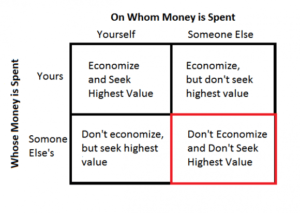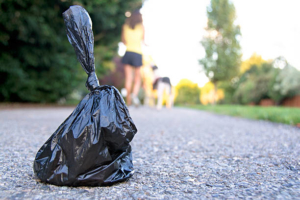My favorite economist, Milton Friedman, used a handy little quadrant to explain four ways to spend money: One, your money on yourself- you spend to gain the highest value. Two, spending your money on someone else – say a gift, you still look for value but remember, it’s the thought that counts. Third, spending someone else’s money on yourself; value is going to be a lot less important. Lastly, spending someone else’s money on someone else – no concern about price or value. This fourth way, dear reader, is the way the government spends your money. 
That’s why taxpayers are often left out in the cold. A perfect example of this is the District Energy System.
Let me first say mea culpa. I was on the Council that approved the District Energy System and I was on the Whistler 2020 Development Corporation Board that developed Cheakamus Crossing, which by the way was the most talented group ever put together to work on a project in Whistler. You can’t blame that group for the problems with the DES. You can blame the Council that approved it, but ultimately it’s the council of the day that is responsible for it now.
Here’s how councils make these decisions: they blow a lot of hot air and make statements like “were going to be the greenest town on earth!” This is music to the ears of a seemingly endless parade of environmental consultants that tell you about this amazing technology that is going to save you tons of greenhouse gas emissions and save millions of dollars. It’ll cost you a fortune up front but that’s okay, you’ll have huge savings later. This gives councilors a warm and fuzzy feeling and they can brag about their green credentials, so they approve it. The list is long of underperforming extremely expensive technology that’s supposed to save you money down the road… but, it’s a dead end! These schemes rarely, if ever, provide the cost savings that are promised.
The aftermath of these decisions leads to the sunk cost fallacy; the idea that people are likely to continue with a project if they have already invested a lot of money, time, or effort in it, even when continuing is not the best option. Chillingly I believe this is the case with the DES. The residents of Cheakamus Crossing never asked for the greenest, fanciest, most complex heating system in the world. I think they just want to turn the heat up or down depending on whether they’re hot or cold. It’s time to call an electrician, rip out the DES and put in baseboard heating; at least you’ll know how it works and if there’s a problem you can call the electrician back and tell him to fix it.
After reviewing the 20 page Council report on the DES, I’d say it generates a lot of heat but no light, my takeaway from the report lies in the final paragraph, “We feel the RMOW is doing a good job running and maintaining the DES system.” I’m sure they are, the problem is that the RMOW is spending your money running and maintaining something they shouldn’t be… It should make your blood boil.
Ralph Forsyth is a local entrepreneur, Ski Instructor and Bike Guide he served on Whistler Council from 2005 to 2011 He’s an eccentric who likes to wear suits, quote Machiavelli and throw down big tricks in the bike park.
This Column was originally printed in the Whistler Question’s “Off the Record” on July 12, 2016

